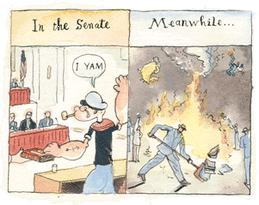Take it from a Librarian:
Comics are Real Books! | |
Librarian Karen MacPherson | | |
Writing in this past Sunday's Washington Post, librarian Karen MacPherson confirmed something that we at TOON Books have been advocating for a long time. Far from being a lesser form of entertainment, comic books are a great educational tool for young readers, and most importantly, kids love them.
| |
Librarians are at the forefront of what some see as the “battle” to shift kids’ attention from screens to books, and hold them. As MacPherson reminds us, comics can be a great entry-point to literature for children who are less inclined to pick up a text-only book:
“We know that comics are especially beneficial to struggling or reluctant readers, as well as English-language learners. These books also offer all readers a way to practice important reading skills such as building vocabulary, understanding a sequence of events, discerning the plot of a story and making inferences. And comics give young readers training in visual literacy — helping them read and interpret images — an essential skill in our highly visual world.”
| |
|
| |
|
 Françoise Mouly |
So, if our librarians seem to agree that comics are an essential educational tool, where does resistance to comics come from? In her article, MacPherson spoke to the publisher, editorial director and senior designer of TOON Books, our very own Françoise Mouly, about the history of comics in the USA and some misconceptions held by parents who sometimes fear that their children should be directed towards books that only feature text.
| |
 Illustrations by Barry Blitt | As Mouly told MacPherson “in the 1950s, congressional hearings were held on what lawmakers saw as a possible connection between juvenile delinquency and comics. Worried that the federal government would try to regulate their industry, comics publishers established the Comics Code Authority as an alternative to government regulation. The Comics Code required that comic books show respect for established authority and banned nudity and explicit violence. While voluntary, the code was followed by many publishers, resulting in an industry focused largely on producing simple, laugh-inducing kids’ comics like Archie.”
| |
But so much has changed since the 1950s, and comics are no longer limited to light entertainment in the back pages of newspapers. Even popular superhero comics like Batman took a darker, more literary turn in the 1980s, and the comics medium began to receive sustained critical attention, along with a more privileged position within the literary establishment. The high-water mark of this trend is undoubtedly the Pulitzer Prize awarded in 1992 to Art Spiegelman’s Maus, the first time a Pulitzer had been awarded to a comic.
| |
Mouly has been a leading proponent for broader recognition of the medium’s possibilities for over forty years. In 1980, Mouly published Maus in RAW magazine, twelve years prior to Maus receiving the Pulitzer Prize. In co-editing RAW with Spiegelman, her partner and husband, their intent was to show that comics could display literary and artistic qualities on par with other media (like novels or painting) whose importance seemed undisputed. One of the team’s mottos then was “Comics: not just for kids.”
| |
In 1998, seeing comics – now dubbed Graphics Novels – were more widely accepted in bookstores, libraries, and museums, Mouly, the parent of two young children and the publisher of RAW Books and Graphics, founded RAW Junior as an imprint to publish and advocate for comics for kids. Twenty-two years later, it’s rewarding to see that a major newspaper like the Washington Post takes a stand for kids’ comics, and affirms that they’re not just for adults anymore.
| |
Nowadays, the essential role of comics in children’s literature is widely accepted, and there are many prizes awarded to the best comics, including the Theodor Seuss Geisel Award (won by TOON’s Geoffrey Hayes for Benny and Penny in the Big No-No!) and the Will Eisner Comic Industry Award, for which TOON has amassed ten nominations over the past few years. It comes as no surprise then, that Françoise Mouly has recently received her fourth nomination to the Eisner Awards Hall of Fame!
| |
|
| |
|
Thank you to Karen MacPherson and the many librarians who continue to champion comics for kids! | |
|
|
| |
|